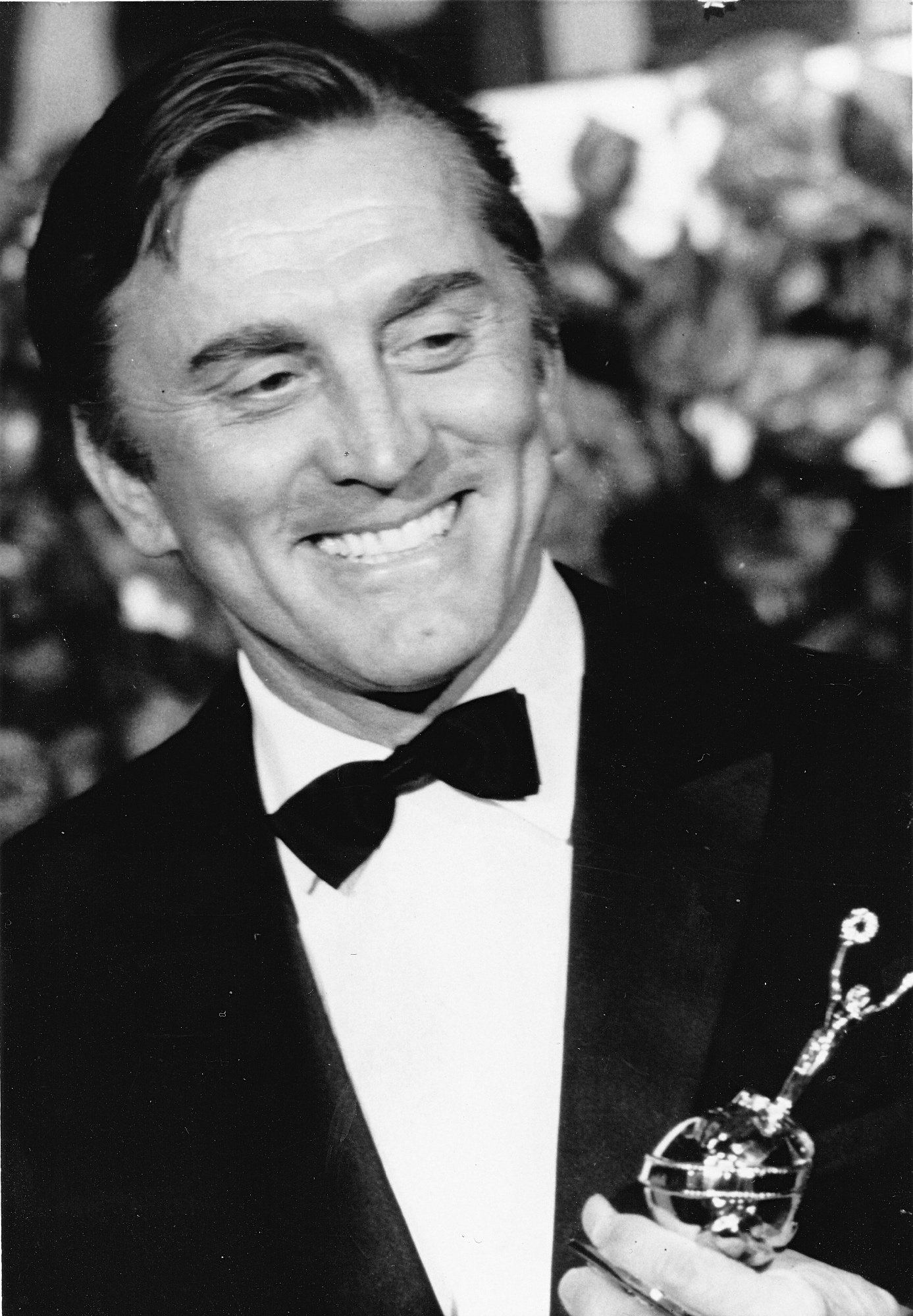
- Cecil B. DeMille
Ready for My deMille: Profiles in Excellence – Kirk Douglas,1968
Beginning in 1952 when the Cecil B. deMille Award was presented to its namesake visionary director, the Hollywood Foreign Press Association has awarded its most prestigious prize 66 times. From Walt Disney to Bette Davis, Elizabeth Taylor to Steven Spielberg and 62 others, the deMille has gone to luminaries – actors, directors, producers – who have left an indelible mark on Hollywood. Sometimes mistaken with a career achievement award, per HFPA statute, the deMille is more precisely bestowed for “outstanding contributions to the world of entertainment”. In this series, HFPA cognoscente and former president Philip Berk profiles deMille laureates through the years.
Nobody believed in Kirk Douglas as much he believed in himself.
Not only is he the oldest living Cecil B. deMille recipient, he’s the only recipient whose son is also a Cecil B. DeMille honoree. Perhaps not the most affable man in a town of fawning sycophants, he has had to fight his way to the top.
It was his fellow Broadway trouper Lauren Bacall who recommended him to famed producer Hal Wallis who was looking for talent to complement his stable of newcomers. Signed by Wallis, his first role was playing Barbara Stanwyck’s weak husband in Lewis Milestone’s melodrama The Strange Love of Martha Ivers, but that was the last weak character he ever played. Soon after he was loaned to RKO for further supporting roles in Rosalind Russell’s ill-fated Mourning Becomes Electra and Jacques Tourneur’s noir classic Out of the Past. Then back at Paramount in Wallis’s I Walk Alone, he was not a happy camper. He wanted leading roles not supporting ones, and he tore up his contract.
He made three films at 20th Century Fox including the classic A Letter to Three Wives, but in all three again he had supporting roles. Then, when offered a featured role in The Great Sinner— the stars were Gregory Peck and Ava Gardner — he turned down three times the salary to play the lead in an independent film that he felt would be his ticket to stardom. The film was Mark Robson’s Champion for which he earned an Oscar nomination, and from then on he was Kirk Douglas, superstar.
He was one of the first Hollywood stars to form his own company, Bryna Pictures, named after his mother, which allowed him to star in and own his own movies. He broke the Hollywood blacklist by hiring and giving screen credit to the most courageous of the “Unfriendly Ten”: Dalton Trumbo.
He’s worked with more great directors than any other star, yet throughout his illustrious career he has won only two awards for acting, the Golden Globe and the New York Critics Award for Lust for Life. Obviously in this business popularity determines awards rather than merit, but he had the last laugh when he was given lifetime achievement awards from the Academy, the American Film Institute, BAFTA, the César, National Board of Review, the Producers Guild, the Publicists Guild, the Kennedy Center; in fact, the list is endless. The HFPA, however, was the first.
After Champion, he freelanced, at Warner Bros. with Michael Curtiz’s Young Man with a Horn and The Glass Menagerie, at RKO with Raoul Walsh’s Along the Great Divide, and then he made two prestige pictures at Paramount, Billy Wilder’s Ace in the Hole and William Wyler’s Detective Story, in which the gives one of his greatest performances, justly rewarded with a Golden Globe nomination.
He was back at RKO for adventure movies such as The Big Sky, directed once again by Howard Hawks. He then played one of his signature roles in Vincente Minnelli‘s The Bad and the Beautiful, which earned him his second Oscar nomination.
A spate of mediocre films followed, although made with top directors Minnelli, Edward Dmytryk, and Anatole Litvak. He worked for Disney on 20,000 Leagues Under the Sea, which was a huge box office success, and then in the span of three years achieved screen immortality with his three greatest performances, in Minnelli’s Lust for Life, John Sturges’s Gunfight at the O.K. Corral and Stanley Kubrick’s masterful Paths of Glory, which he also produced.
After that, he coasted along in The Devil’s Disciple and Richard Quine’s Strangers When We Meet, but then he starred in and produced the blockbuster success Spartacus, which became his most famous role, and which won the Golden Globe as best picture. More acclaimed overseas than in the States, the film has earned almost two billion dollars worldwide.
So what could he do for an encore?
Both Town Without Pity and Robert Aldrich’s Last Sunday were disappointments, and even his all-time personal favorite, Lonely Are the Brave didn’t get much love from the critics. After that, he made a number big-budgeted studio films, including Elia Kazan’s listless The Arrangement and John Frankenheimer’s masterful Seven Days in May, produced by his good friend and frequent co-star Burt Lancaster. But essentially his career was over. He suffered a debilitating stroke in 1996, but persevered and has continued to act in movies.
His classic performances? Detective Story, Lust for Life, Paths of Glory, to name just three.

